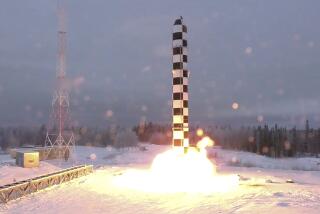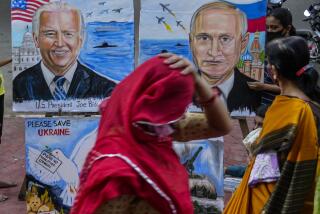India’s Dangerous Stubbornness
- Share via
The 51st anniversaries of the U.S. nuclear bombing of Hiroshima and Nagasaki, which ended World War II, were marked two weeks ago. This August, like that dramatic August of 1945, the issue of nuclear weapons is front and center and, unfortunately, the prospect of getting dozens of nations to approve a permanent ban on nuclear weapons testing appears headed for a stalemate.
The sticking point is India’s insistence that the five nations that acknowledge having nuclear weapons commit to destroying them by a specific date. Until the United States, Britain, France, Russia and China agree, India will not sign a test ban treaty. Worse, under United Nations rules, New Delhi can block an agreement from taking effect, and it has vowed to do so.
The nuclear powers refuse to give up their weapons of mass destruction. In addition, they have said the test ban treaty will not take force until the signatories include three nations thought to either have nuclear weapons or the capability to quickly assemble them: Israel, Pakistan and India.
India has fought one war with China and three with Pakistan. It is understandably worried about those two nations’ nuclear intentions. The Indians also have a compelling point in saying that denying nuclear weapons to nations without them, while letting those that have them keep them, constitutes a double standard. But that situation is unlikely to change any time soon.
The reality is that India has campaigned for a ban on nuclear weapons for more than 40 years, yet it detonated a nuclear device of its own 22 years ago.
India is right to state its position loudly and clearly. But it should not attempt to block adoption of a permanent test ban, more than two years in the making.
A number of nations--including all the countries that have nuclear reactors--have agreed to the pact after much tough bargaining. There are provisions to go to the aid of non-nuclear states threatened by those that possess the weapons, a protection against nuclear blackmail. There are agreements for close inspection of nuclear weapons facilities.
Even if the treaty is not technically in effect, signatories will feel the pressure to heed its provisions. And those who have signed can urge India to add its signature as well. There must be a way to satisfy New Delhi.
More to Read
Sign up for Essential California
The most important California stories and recommendations in your inbox every morning.
You may occasionally receive promotional content from the Los Angeles Times.










